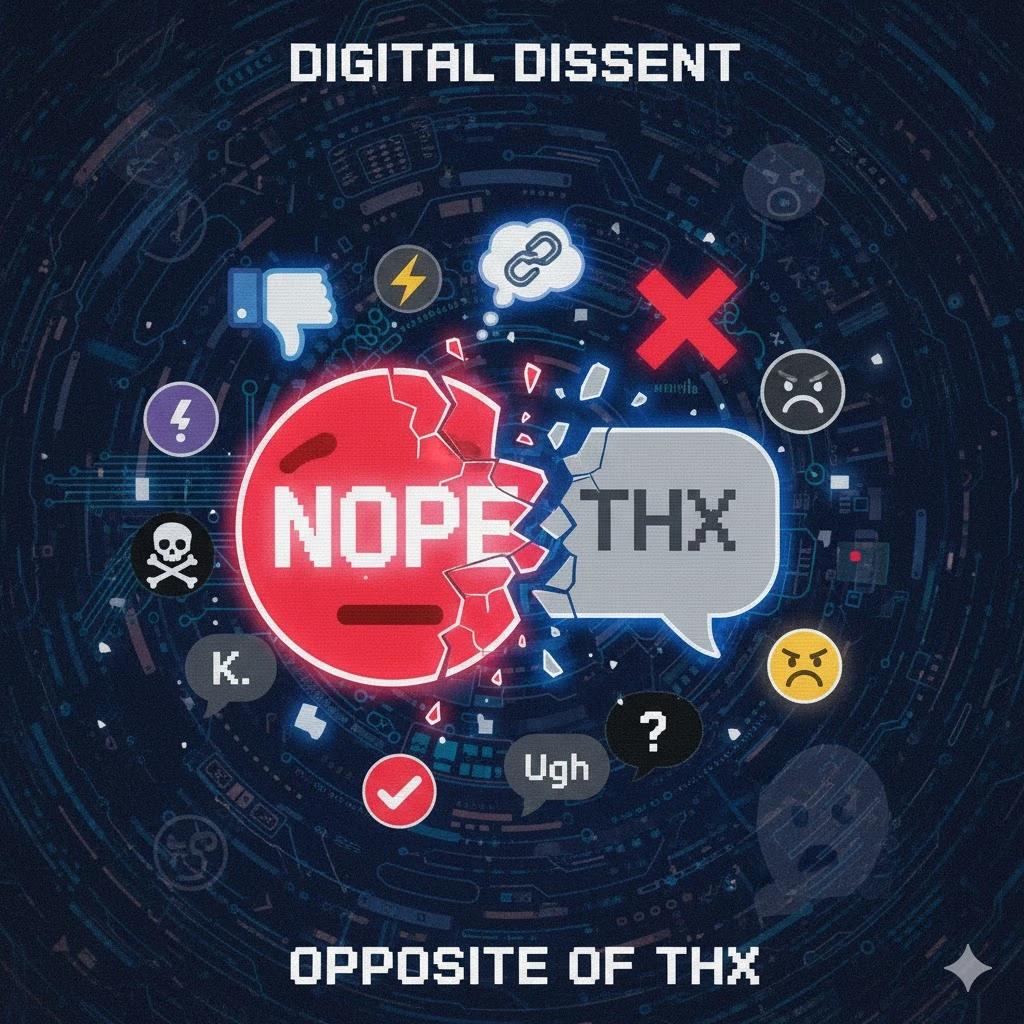You tap out THX every day. It’s easy, right? That little code, short for “thanks,” is digital gold. It signals appreciation, fast. We use it all the time. But this speed for positive cues makes you wonder. What’s the slang acronym for the opposite of THX in texting? What efficient shorthand means refusal? Or pure, cold ungratefulness? There ain’t one. The truth is messy. You won’t find a neat three-letter anti-thanks. The genuine antonym for thx in texting is actually a collection of subtle, context-driven negative signals.
The Anatomy of Appreciation: Why We Love THX
Texting is an art of the quick fix. We want minimum friction. We invented THX (phonetic abbreviation, clever, huh?) and TY (Thank You) for a reason. They keep the social machinery humming along. You send a good link, you get a THX. You send back an NP (No Problem) or even a warm YW (You’re Welcome). Simple. Clean.
| Abbreviation Family | Function | Social Goal | The Real Inverse |
| THX / TY | Expresses Gratitude & Acceptance | Maintains harmony. Closes the deal. | Communicates Rejection, Apathy, or Scorn. |
| NP / YW | Acknowledges Thanks | Assures the sender the favor was minor. | Dismisses the action’s value. Stop talking. |
Export to Sheets
The core of THX is cooperation. It signals yes and I value your effort. Therefore, the opposite of THX isn’t a word. It’s an action. It’s efficiently communicating dismissal, refusal, or disrespect.
The Three Faces of Textual Negativity: Expressing the Opposite of THX
Since no single, dedicated anti-thanks acronym exists, people get creative. They repurpose familiar codes. These three categories are how texters truly express textual shade.
A. The Code of Indifference (Dismissal)
These terms are a virtual shrug. They drain all value from the exchange. You signal the offer was useless. Don’t bother me.
- NVM (Never Mind): You ask for a quick favor. The person takes too long. You text back NVM. You just cancelled their effort. Efficient dismissal. You showed their slowness negated their help.
- NBD (No Big Deal): Formal analysis suggests this means “No Big Deal.” But use it after someone gives you a huge gift. It’s condescending. You minimize their monumental effort. It kills the thanks.
- IDK (I Don’t Know): You send a partner three highly researched options for dinner. They reply only IDK. That’s pure conversational laziness. This low-effort response is the functional opposite of THX.
B. The Acronyms of Refusal (Rejection)
THX is acceptance. A strong refusal is the antonym for thx in texting. These abbreviations slam the door shut.
- Pass: This is maybe the best single-word substitute for anti-thanks. Someone invites you to a terrible party. You simply reply, “Pass.” It’s concise. It’s definitive anti-acceptance. No discussion needed.
- SMH (Shaking My Head): More than a simple “no.” This shows disapproval. SMH implies the idea was bad, not just rejected. It adds a layer of judgment, making it a strong “thanks, but no thanks.”
- WTF (What The F***): Extreme times call for extreme measures. When an offer is insulting or ridiculous, you need the fast, harsh shutdown of WTF.
C. The Silent Killer (Ingratitude and Ghosting)
The most brutal form of dissent is the most minimal. This is the text abbreviation for ingratitude. It’s the highest textual snub.
Case Study: The Final Dot
You spend your morning researching a solution for a friend. You send them the perfect answer. They reply with a single, lower-case k. Sometimes they use the period: K. That period is the key. It’s intentional. It turns “okay” into a brick wall of dismissal. It’s pure shade. It acknowledges the work but denies the emotional payoff of a THX.
A complete lack of a reply, ghosting, is the ultimate ungratefulness. You worked hard. You got nothing. Silence screams disrespect, confirming the loss of goodwill.
The Digital Divide: Why Texting Prefers Gratitude
There isn’t a single code for the opposite of THX. This happens because texting favors cooperation. It needs to be easy to affirm, to accept, to say thanks.
Expressing negativity requires finesse. You can’t just send an angry acronym and expect good results. Social consequences matter. To avoid offending someone, you must use full sentences. You need the “I appreciate the offer, but I have to pass this time.” The texting lexicon forces you to slow down for bad news. It proves the digital world values TY more than its rude, fragmented opposite.











